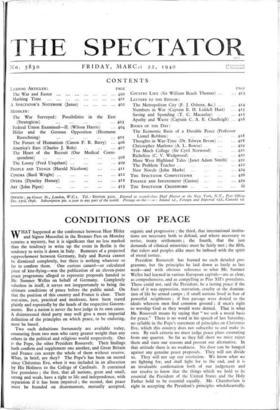CONDITIONS OF PEACE
WHAT happened at the conference between Herr Hitler and Signor Mussolini in the Brenner Pass on Monday remains a mystery, but it is significant that no less marked than the tendency to write up the event in Berlin is the tendency to write it down in Italy. Rumours of a projected rapprochement between Germany, Italy and Russia cannot be dismissed completely, but there is nothing whatever so far to confirm them. One curious canard—or calculated piece of kite-flying—was the publication of an eleven-point peace programme alleged to represent proposals handed to Mr. Sumner Welles on behalf of Germany. Completely valueless in itself, it serves not inopportunely to bring the ultimate conditions of peace before the public mind. On that the position of this country and France is clear. Their war-aims, just, practical and moderate, have been stated plainly and repeatedly by the heads of the respective Govern- ments. But a nation is never the best judge in its own cause. A disinterested third party may well give a more impartial definition of the principles on which peace, to be enduring, must be based.
Two such definitions fortunately are available today, emanating from two men who carry greater weight than any others in the political and religious world respectively. One is the Pope, the other President Roosevelt. Their findings both confirm and supplement one another, and Great Britain and France can accept the whole of them without reserve. What, in brief, are they? The Pope's has been on record since Christmas Eve, when it was included in an allocution by His Holiness to the College of Cardinals. It contained five postulates ; the first, that all nations, great and small, strong and weak, have a right to life and independence, with reparation if it has been impaired ; the second, that peace must be founded on disarmament, mutually accepted, organic and progressive ; the third, that international institu- tions are necessary both to defend, and where necessary to revise, treaty settlements ; the fourth, that the just demands of ethnical minorities must be fairly met ; the fifth, that rulers and peoples alike must be imbued with the spirit of moral justice.
President Roosevelt has framed no such detailed pro- gramme, but the principles he laid down as lately as last week—and with obvious reference to what Mr. Sumner Welles had learned in various European capitals—are as clear, as comprehensive, and as compelling as Pius XII's postulates. There could not, said the President, be a lasting peace if the fruit of it was oppression, starvation, cruelty or the domina- tion of life by armed camps ; if small nations lived in fear of powerful neighbours ; if free passage were denied to the ideals whereon men find common ground ; if men's right to worship God as they would were denied. That is what Mr. Roosevelt means by saying that " we seek a moral basis for peace." There is no word in his speech of last Saturday, no syllable in the Pope's statement of principles on Christmas Eve, which this country does not subscribe to and make its own. By such criteria we must judge peace plans emanating from any quarter. So far as they fall short we must reject them and state our reasons and present our alternative. In that attitude there is no weakness. No door can be banged against any genuine peace proposals. They will not divide us. They will not sap our resolution. We know what we are fighting for, and shall fight for to the end, and it is an invaluable confirmation both of our judgement and our resolve to know that the things which we hold to be essential the President of the United States and the Holy Father hold to be essential equally. Mr. Chamberlain is right in accepting the President's principles wholeheartedly.






































